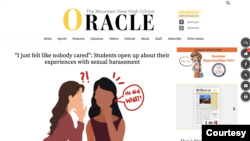Two students and a journalism adviser at a California high school on Thursday filed a lawsuit against their school, alleging censorship and retaliation against the campus newspaper.
The lawsuit, filed in California Superior Court, alleges that the principal of Mountain View High School censored articles about online sexual harassment in the school paper, the Oracle.
In spring 2023, the Oracle’s student journalists published a series on sexual harassment at the high school. But the school’s principal, Kip Glazer, allegedly pressured students to make changes to the article, the lawsuit says.
The suit alleges that Glazer also silenced the student journalists and those targeted with online harassment at the school, canceled the school’s “Introduction to Journalism” course, and removed the school’s publications adviser in retaliation.
“I want to ensure the long-term stability and prosperity of my school’s journalism program and I want student journalists at my school to be empowered to stand by their rights to publish stories that need to be told,” one of the students, Hanna Olson, said in a press release. Olson is co-editor-in-chief at the Oracle.
Neither the Mountain View Los Altos Union School District nor the principal responded to VOA’s requests for comment, made via voicemail and email.
“Student journalists deserve to exercise their First Amendment rights without reprisal, censorship or threats,” Carla Gomez, the journalism adviser who was removed from her position, said in a press release.
The San Francisco law firm Jassy Vick Carolan LLP filed the case on Student Press Freedom Day and is representing the students.
And the nonprofit Student Press Law Center (SPLC) has been advising the students on the case and advocating for their rights.
“This lawsuit serves as a reminder that student journalists can and will stand up for their rights and those of others,” Jonathan Gaston-Falk, SPLC staff attorney, told VOA. “Such flagrant violations of the California Education Code must be addressed and corrected, or else there is no point to having such protections on the books at all.”
His organization has spent 50 years championing the rights of student journalists.
California is one of 17 states that have enacted what are called “New Voices” laws to extend press freedom protection to student journalists.
The legislation came in the wake of the U.S. Supreme Court decision in Hazelwood v. Kuhlmeier in 1988. In it, the Supreme Court ruled that schools and districts can censor student speech and media for “legitimate pedagogical concern.”
Those “pedagogical” or teaching concerns include material deemed poorly written or researched, biased or “unsuitable for immature audiences.”
Critics of the ruling say its language is too broad and imprecise.
Many journalism educators say topics such as online sexual harassment, LGBTQ issues, sex trafficking and race are more likely to result in student journalists being censored.
Amy Burchett of the Journalism Education Association said these battles are on the uptick as students tackle difficult issues.
“We cannot develop well-rounded journalists, especially student journalists, in high school, which is where they get that first taste of learning how to ask questions and interview and investigate,” said Burchett, who is also a publications adviser at Amarillo High School in Texas.
“We cannot develop that, especially to the level we need to, when there is a Supreme Court case that says we cannot do half the things we need to do,” she added.
Media analysts say that nationwide they are seeing instances of campuses dissolving journalism programs, killing stories, censoring and altering stories, and firing or reassigning journalism teachers or advisers in response to student reporting that may be disliked or disapproved by principals, teachers, school boards, parents or other stakeholders.
Self-censorship is also on the rise, say experts, as student journalists feel pressure from administrators, school boards, parents or other stakeholders.
“When the students already know there are going to be problems when they cover certain issues that are legitimately important in school, it’s less likely those students are going to produce that bold journalism that’s important to them,” said Gaston-Falk.
One of the Mountain View students says the lawsuit is necessary to ensure their rights are protected.
“It is important to me that all student journalists have a platform to vocalize their thoughts and opinions and spread information freely without feeling pressure from those in charge to change our stories to meet their priorities,” said one of the students, Hayes Duenow, in a press release.
Their lawsuit is asking for an end to censorship, and the reinstatement of the journalism course and the journalism adviser.
The district and principal have 30 days to respond to the lawsuit.
Editor’s note: This article has been updated to clarify details about the law firm representing the students.




